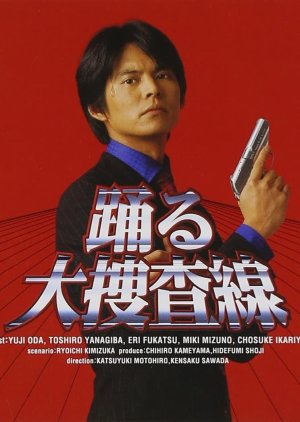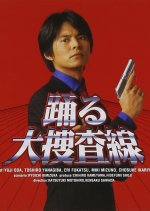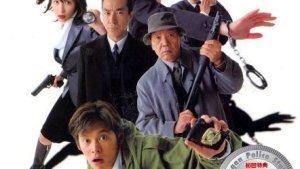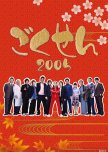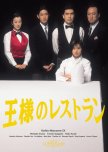 Meet the Writers of MDL
Meet the Writers of MDL - Français
- English
- magyar / magyar nyelv
- dansk
- Titre original: 踊る大捜査線
- Aussi connu sous le nom de: Police Investigation Headquarters , Rhythm and Police , Bayside Shakedown
- Réalisateur: Motohiro Katsuyuki, Sawada Kensaku
- Scénariste: Kimizuka Ryouichi
- Genres: Mystère, Comédie
Où regarder Odoru Daisousasen
Subscription (sub)
Distribution et équipes
- Oda YujiAoshima ShunsakuRôle principal
- Ikariya ChosukeWaku HeihachiroRôle principal
- Fukatsu EriOnda SumireRôle principal
- Yanagiba ToshiroMuroi ShinjiRôle principal
- Ono TakehikoHakamada KengoRôle Secondaire
- Fukawa Toshikazu Rôle Secondaire
Critiques
The 90-ies were a hard time for Japan. The bubble economy had burst and old values were constantly challenged as younger generation grew more and more disillusioned. The dramas of that time either depicted the bleak reality with ultra realism or completely glossed over it. Odoru Daisousasen, on the other hand, walks a fine line between staying an uplifting comedy and acknowledging the grim reality.
The drama's main character Aoshima becomes a police officer after getting fed-up with the way corporate Japan operates. He wants to make the world a better place and, maybe, to take part in some cool car chases and shoot-outs (American movies about hard-boiled cops were all the rage). To Aoshima's disappointment and to the viewer's amusement, though, it turns out that police is no different from the corporate: one needs to go through bureaucratic hoops to perform even the simplest of tasks, nepotism and inertia are ubiquitous, and the most excitement Aoshima can get is to drive the higher-ups places.
Most importantly, Aoshima wants the soulless system of the force to recognise humanity both of police officers and of those they serve. But heavy machinery of the system doesn't allow for such niceties and, moreover, doesn't care for the opinions of its cogs.
The face of this machine is Muroi, a big boss from HQ, who has no regard for the "grunt" workers of the small precinct and their initiatives. Muroi with his cold demeanour, perpetual frown, and lack of social graces is a perfect foil to affable and enthusiastic Aoshima. They embody two sides of the central conflict of the drama: the cogs vs the wheel, the human touch vs the bureaucracy.
What's brilliant in this drama (and what's rarely found in its successors) is that the conflict is very much real with no obvious winning side. It's true that taking care of the victims of crimes is important but it's also true that police force lacks resources for that. Bureaucracy is ineffective but it also protects society from power abuse by the force. As much as main characters want to make suspects cooperate by roughing them up, we as the viewers from 2020 know that this method cannot be condoned in 21st century.
Strengthened by the thematic conflict, the tense confrontations between Aoshima and Muroi are among the most dramatic scenes of the drama. Aoshima is no naive young man he seems to be - after all, he was a top performer of the sales department he worked in before - and he uses his wit, boundless enthusiasm, charm, and occasional guilt trips to gradually weaken Muroi's defenses (that poor tsundere guy).
But Aoshima is no Mary Sue and when he goes all out, the drama becomes uncomfortable to watch - a marker of good old Japanese storytelling that makes the viewers bite their nails as they watch a hero doing the right thing despite very obvious, very immediate repercussions.
The day-to-day life of police officers is shown very candidly and with great humour. The drama illustrates how Japanese police solves cases by throwing huge teams at them and how most cases are routine and simple affairs. The focus is often on the everyday heroism of ordinary officers which is to be expected from the country that doesn't believe that there are unimportant jobs however insignificant they may seem.
The drama was made in 1997 which excuses some of its old-fashioned elements (sexism, simplicity, and Showa era nostalgia). If you could watch Gokusen, GTO, or Hero without rolling you eyes, you would easily watch this too. Some things of the past like tamagotchi or fledgling internet are, on the contrary, are nice to see (if you lived in 90-ies). Hilariously, there is an episode that depicts younger generation as introverts who are obsessed with their gadgets which would have been Millennials bashing if the drama had not been made in 1997.
This drama was the first in Japan to realistically portray the life of police officers. Thus, it established many tropes for the genre. Most notably, the intense antagonistic relationship between the main character and another more competent or powerful officer has appeared almost in every police drama since (see BG, Bitter Blood, Tokyo Dogs, S Saigo no Keikan, etc). Seeing the drama where this trope originated really opens one eyes to the shortcomings of the successors.
Arguably, Odoru Daisousasen works so well because it was made in 1997. It was cutting-edge drama then which many modern dramas of the same genre fail to be.
I can't recommend this drama enough and I gave it 8.5 instead of 10 in order to be fair to other timeless classics. But for me personally it's a solid ten.
Cet avis était-il utile?

A classic for a reason
This show appears on many must-watch lists but I think it made only one appearance on US television not long after its release. It has now been brought to a wider audience by Netflix after having depended on fansubbers for decades.The key themes and tropes are classic cop show stuff: rookie detective fighting the power and kicking ass. However, it does not take The Man lightly and sometimes The Man does win. There are episodic battles and victories but the final showdown is slippery and elusive. The conflict is so open-ended that enough meat is left on the bone for nearly as many follow-up films as Star Trek. If you like clean, decisive, flag-waving triumphs over adversity you should prepare yourself for a lesson in nuance.
Bayside Shakedown is well cast and very well acted. A confidently directed group of skilled actors lets the story speak for itself. Lines are blurred between heroes, villains, and anti-heroes. The characters are solid and believable. The character interactions are credible. The romance is limited but natural and unforced. The comic relief is more sitcom than OTT. It's about as complete as it gets.
If in some way it reflects attitudes of its time it's being realistic rather than dogmatic. In that sense I will say that, the universal smoking habit aside, it has aged unexpectedly well. You will definitely get more out of it if you're from a country or of a generation that can relate to dealing with an entrenched bureaucracy, byzantine regulations, or a Kafkaesque organizational culture, and like seeing those things challenged or subverted. The modern North American audience will find the "Reefer Madness" commotion over less hash than the average Coloradan can consume in a weekend, if not baffling, at least a bit amusing.
It's never a priority for me but I will note that the music is an oasis in the sea of cheaply produced garbage that Japanese television is still half-heartedly trying to wean itself off. It adds to the atmosphere instead of interfering with your enjoyment.
Should you watch Bayside Shakedown? You have an unqualified YES from me. Not only because it's a touchstone with references or homages in many later works but because it's a good show in its own right. It's been nearly three decades since its release but, not being Japanese and without being influenced by nostalgia, I can still rate Odoru Daisousasen a solid 9 in 2025.
Cet avis était-il utile?

